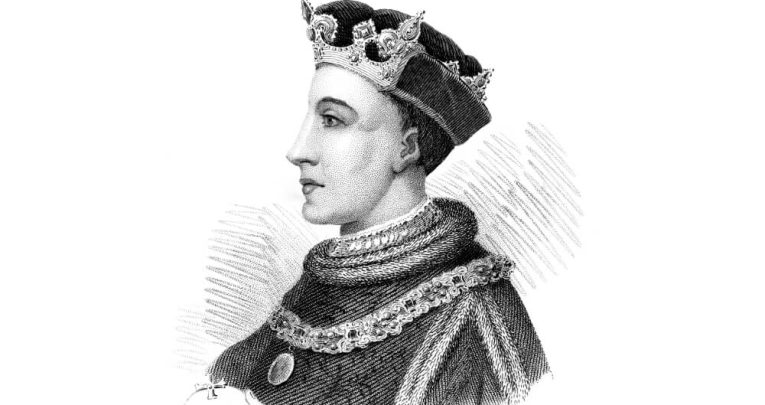Understanding Shakespeare’s Henry V Through Key Quotations

Helen Mears explains how some of the key utterances of one of Shakespeare’s most memorable monarchs impact on our understanding of his character…

- by Helen Mears
- English teacher and British Shakespeare Association education committee member

Who is he?
The concluding part of a trilogy telling the story of Prince Hal’s rise from rebellious teen to king, Henry V is probably the most popular of Shakespeare’s English History plays.
Henry V himself is often seen as the archetype of the great, heroic, Christian king.
He also speaks some of the most popularly quoted lines in Shakespeare.
Quotes
“And tell the Dauphin
His jest will savour but of shallow wit
When thousands weep more than did laugh at it.”
(Act 1, Scene 2, lines 295/8)
Henry’s response to the Dauphin’s gift of tennis balls, alluding to his misspent youth, shows his anger at being mocked. He uses this anger as both a justification and a spur for his invasion of France.
“If little faults proceeding on distemper
Shall not be winked at, how shall we stretch our eye
When capital crimes, chewed, swallowed, and digested,
Appear before us?”
(Act 2, Scene 2, lines 55/7)
Henry shows his cleverness here when he tricks the traitors, Cambridge, Scroop and Grey, into urging him to severely punish any man who acts against him. He gives them enough rope to hang themselves.
“And you, good yeoman,
Whose limbs were made in England, show us here
The mettle of your pasture; let us swear
That you are worth your breeding – which I doubt not”
(Act 3, Scene 1, lines 25/8)
One of the most well-known speeches in this play, known for its ‘unto the breach’ opening and its climactic war cry “God for Harry, England and Saint George”, this is a rallying cry to urge Henry’s soldiers into battle. Shades of young Prince Hal are present in the fact that he addresses not only his nobles and knights, but the baser yeoman who make up the bulk of his army.
“Therefore, you men of Harfleur,
Take pity of your town and of your people
Whiles yet my soldiers are in my command”
(Act 3, Scene 3, lines 27/9)
The first hint in the play of the darker side of King Henry, the alleged war-criminal.
Here he entreats the governor of Harfleur to end the siege, threatening that he may no longer be able to protect the women and children of the town from the appetites of his army.
It can be argued that Henry is exaggerating the danger in order to force the surrender, but some commentators believe the threats to be real.
“We would have all such offenders so cut off; and we give express charge that in our marches through the country there be nothing compelled from the villages, nothing taken but paid for”
(Act 3, Scene 6, lines 106/9)
Another example of Henry showing his kingly status. In an echo of his rejection of Falstaff at the end of Henry IV Part 2, here he shows no regret for the fact that Bardolph, one of the companions of his youth, has been executed for stealing from a church. Interestingly, the line is delivered in prose, perhaps showing a touch of nostalgia for his teenage antics?
“I think the King is but a man as I am: the violet smells to him as it doth to me.”
(Act 4, Scene 1, lines 103/5)
Henry’s plan to mingle incognito with his common soldiers on the eve of the Battle of Agincourt does not turn out quite as he hoped, and he finds out their true feelings towards him and the reasons for the invasion.
Although he speaks again in the prose he learnt in his salad days in East Cheap, he realises he does not understand his people as well as he thought he did and finds himself desperately defending what it is to be a king and what responsibility he has for the souls of his soldiers.
“For he today that sheds his blood with me
Shall be my brother; be he ne’er so vile,
This day shall gentle his condition.”
(Act 4, Scene 3, lines 61/3)
Perhaps chastened by his encounter with Williams and the other soldiers, Henry’s speech before the battle of Agincourt is not so much a rallying cry as a new understanding that all his soldiers are of equal importance and deserve to be remembered for their bravery and willingness to fight alongside him.
Helen Mears is an English teacher who sits on the education committee of the British Shakespeare Association. Follow her on Twitter at @shakesmears.







